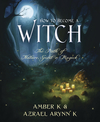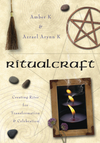Ritual, Life, and Everything

Some of the best moments of our lives have been spent with unusual people, in strange places, doing odd things. The unusual people have included Witches, magick workers, Druids, sacred clowns, Fairies, Elemental Spirits, plant devas, animal allies, and ancient gods and goddesses of a dozen distant lands.
The strange places? High in the gnarled limbs of a huge old willow tree, under a full moon. Deep under the earth, crawling through dark, narrow, twisted tunnels. Dancing around a blazing forty-foot bonfire while a hundred drums thundered in unison. In a candlelit Temple of Isis, hidden underground in a modern American city.
The odd things we do? Rituals. Oh, we enjoy classes and parties and potluck dinners and other things, but it always comes back to ritual: ritual to celebrate holy days that we could scarcely pronounce; ritual to heal illnesses that confounded medical experts; ritual to break long droughts and bring life-giving torrents of rain; ritual to banish confusion, anger, and fear and draw forth clarity, compassion, and courage; rituals to mark the great passages of life and death, from birth celebrations to memorial rites.
We do ritual because the human heart and soul need ritual. But like many other things we need for health and wholeness, (such as occasional solitude, extended family, harmony with nature), ritual is an endangered activity in Western (un)civilization.
Our culture is ritual-poor. We have no real rituals for young people coming of age, for respected adults becoming elders, for ancestors who should be remembered and honored. Because of this, we lose clarity and respect among the generations, we sever our ties with our heritage, we let ill-prepared man-children and women-children wander uncertainly toward the future. The few rituals we do have as a society, like the sheet cakes and jello served afterward, are pallid and unsatisfying. High school graduation ceremonies, baby showers, and birthday parties cannot sustain a culture.
But ritual doesn't have to be like that. We have known rituals that were exciting, mysterious, scary, intriguing, ethereally beautiful, boisterous, sweaty, cathartic, awe-filled, regenerating, painfully transformative, outrageous, breathtaking, ecstatic, overwhelming, hilarious, wild, deep, primal, and weird. We know it can be done. We have done it. We have created a dragon elemental under mountain skies as lightning cracked overhead. We have splashed and poured water on one another and watched the skies open to release the rain. We have weighed the soul of a departed brother against a white feather, on the Scales of Ma'at, and released him to the Sun God. We have laughed and cried and shouted for joy, and been transformed, and we know what ritual can do.
So we wrote a book. It seems to be part of what the Goddess wants from us, part of a teaching-sharing-learning calling. We wrote RitualCraft to let people know that this ancient and poorly understood tool—ritual—could be exhilarating and splendid, could change lives, could even help change the world.
We had the stuff of a book. Between us, we have over forty years of experience with ritual. We had our memories of the best (and worst) rituals we had ever been part of. We had our personal files, with outlines and notes and ideas. We had wonderful input from our students, from teaching many workshops on ritual. We had access through friends and the Internet to rituals around the world—so we could include ceremonies from Africa and the Middle East and the Far North, and much more.
Now, there are already some fine books on ritual out there. But many are very short, or focused on solitary rituals, or just Sabbats, or only rites of passage, or just one tradition's perspective.
We wanted something more comprehensive, both broader and deeper. We wanted to cover the pitfalls as well as the possibilities. And we wanted to encourage you to be creative and daring, to stretch the boundaries, to dump the cookie-cutter, read-from-the-book type rituals and spread your wings. So we did it; we shared all that we could cram into six hundred pages or so. And the book has a lot—theory and sensory modes and mental states and very diverse rituals from all over to illustrate the insights. Altars and costumes and chants, oh my.
We wrote RitualCraft because our communities need great rituals for bonding, for healing, for transforming what we do and who we are as a society. Beyond that, ritual is a tremendous tool for self-transformation. Choosing to mold yourself, to create a better you, is the greatest art there is because its raw material is a living person. And beyond all the safe and common tools, the self-improvement books, adult evening classes and exercise programs, there is ritual. There is magick.

About Amber K
About Azrael Arynn K
Related Products


is subject to certain Terms and Conditions